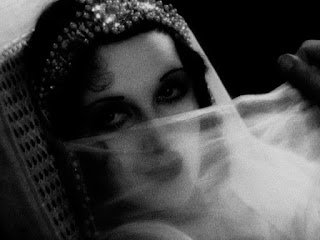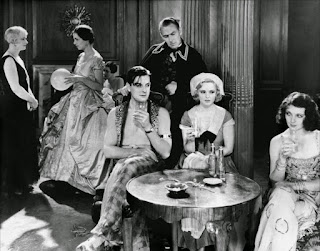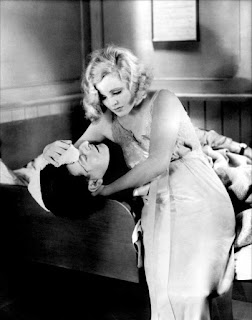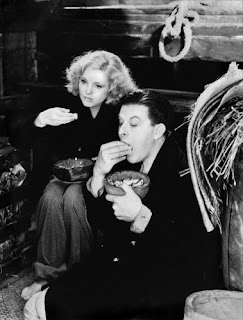30s Hitch: Rich and Strange (1931)
This failure unquestionably affected Hitchcock. There is something paradoxical about the fact that this popular film director never managed to get his most daring, his most candid, works accepted. The failure of Rich and Strange, like the later failure of Under Capricorn, undoubtedly prevented him from continuing along a path that he nevertheless knew was promising. If we consider Hitchcock's overall career until now [1957], it immediately becomes apparent that all his films tend to blaze or consolidate a new trail, and that just when things are about to take off, a commercial failure checks his élan and forces him to look elsewhere. His most sincere works, such "pure films" as The Manxman, Rich and Strange, Under Capricorn, and most recently The WrongMan, were culminating efforts, whereas to Hitchcock's way of thinking, they should have been points of departure.
Eric Rohmer and Claude Chabrol, Hitchcock: The First Forty-Four Films(1)
The Skin Game, Hitchcock's previous film was met with good box office and critical acclaim. Rich and Strange met with neither. Despite a flat cast, it's the better film; Hitchcock had a broader canvas work with, the open sea as opposed to single rooms; the central conflict and dramatic tensions resulting from that are more substantial, and frankly, we get a taste of the kind of suspense that is soon to come.
It's reasonably clear why audiences didn't respond favorably at the time; despite its comedic beginning, Rich and Strange is a portrait of a dissolving marriage, with a genuinely nightmarish final act, and a dry, wry, and fatalistic finale.
There is a kind of confusion, of sorts, about the film's script's origin. It is, according to the credits, based on a novel by Dale Collins, and adapted by Hitchcock with the scenario credited to Alma and Val Valentine. Hitchcock told Truffaut that he and Alma went to France to do research for a film in 1926(2). Others, notably Spoto have mentioned that the idea was based on their honeymoon voyage(3). As for Collins' novel, it was released in 1930 and it appears that Collins knew the Hitchcocks and Barr wonders if there isn't a connection(4). Did Collins develop the story after Alfred and Alma had mentioned their adventures? Wherever the origin of the script lay, the movie remains one of the few early films - and to Rohmer and Chabrol's point - one of his few films overall, that was produced genuinely independently.
It is a very personal film, born from a personal vision. It's also far more interesting than his other periods in this period (with the possible exception of Murder!); more's the pity that it met with such a negative reaction. All of that said, it's not exactly universally acclaimed. In large measure, the performances render the film nearly stagnant. Henry Kendall, who plays Fred, was a stage actor, director and writer who had low or little regard for film or at least, his film work. Admittedly, Fred is supposed to be a bit of clod; but Kendall mugs more than acts and in the tenderer moments with Emily (Joan Barry, who is almost the sole actor aware of what the script demands), he's flaccid, at best. Even his scenes with The Princess, the con artist who's bilking him is played so one-note, you wonder why Hitchcock didn't fire him. Then there's Commander Gordon, a decent enough fellow who woos Emily, and played by Percy Marmont with a little morel life, but the character as written doesn't require much of the actor, except a core decency of a distinctly British sort. I honestly don't quiet know what to make of Betty Amann as The Princess. She's definitely "a looker" in the parlance of the times, but her performance seems pretty camp and/or self-aware. Either that, or she didn't get word that movies had entered the sound era.
Normally, i could convince myself that these performances actually enhance the film, but the men are too faded and dull and Barry and Amann while worthwhile for certain moments are often derailed by their male scene partners. Nevertheless, a quick summary of the film gives some idea of what the viewer is walking into.
Fred is an office drone who we meet in a Chaplinesque opening sequence of an army of similar drones, umbrellas in hand coming toward the screen two by two. Fred is unique: his brelly won't open and credit where credit's do, Kendall does sell this. By the time he gets home, why of course, the umbrella's fine and Fred settles into an evening of dissatisfaction and remonstrance against life. Twelve years, he complains to Emily, and nothing to show for it.
In the initial dialog between Em and Fred, he asks why she shouldn't have a hairdresser and a ladies' maid to which Emily replies that she "never expects those things." Fred's response? "No, that's just it. The good little women like you don't want enough." The line is delivered disdainfully and there are echoes later on when Fred tells the Princess that he was "too much" for Emily, that she didn't really understand him.
I've remarked elsewhere about Hitchcock's relationship with/attitude towards the working class and later, we'll be seeing more of his complicated relationships with/attitudes toward women. Here, we begin to get an idea of what's to come. I'd like to say that Emily will exercise considerable agency here, but honestly, that's not part of the philosophical package. The characters aren't here for their agency, but the reverse; they are about to bump up against determinism and the unconscious. Determinism in the sense that despite Fred's desire to act, to go traveling, and in the next sequence after saying it, receives a note from his uncle that rather than wait for the old fellow's demise to inherit, why not take the money and go live!
The rest of the movie rather drives home the wall of fate that proscribes the best laid plans and because of ignorance, the reverse of romance is bound to intrude. At this stage in his career, I don't know that Hitch's Catholic education is drawn on to force readings of tempting fate and dealing with greed and/or hubris as a sin resulting in a punishment corollary to the degree to which they are indulged, but by the end of the film, after each has had an affair where both are party to the disintegration of their marriage, where they've been witness to the indifference of the universe and the quiet disdain and manipulation of their fellow human beings, you could be forgiven for thinking that the karmic payback was heavier. However, after they return to bickering once their travails are over, you might feel that Fate didn't deal a heavy enough hand.
The first half or so of the film treats the couple lightly as they play out the naifs on a cruise to the Far East, their interactions with the people they meet en route, Fred's seasickness, and then the slow turn to a darker turn of events. As Emily falls for Gordon and Fred for the Princess, the satire is more sharply barbed and Hitchcock executes his charges' trials with disdain. There's something here that anticipates the Coen brothers approach to dupes and dopes. Both filmmakers are unsparing in their clarity of what the protagonists are enduring and you could argue that both the Coens and Hitchcock take a disinterested God's eye view of the comedies of errors that play out.
I say "disdain" and that may sound as though Hitch is unsympathetic to his characters. To some degree, that might be fair, but he does pull back on Emily and reveals her to be the one with the heart and brains in the couple. She very well, could have run off with Gordon, but when he tells her that Fred is being used and drained by the Princess, she rallies to warn him. He doesn't believe her and there is a moment when you almost find yourself agreeing with Gordon that Fred is a patsy and too weak for respect and that frankly, Emily should leave him. But we go back to Fred's assertion that she should want more from life; he does recognize her value outside societal limitations.
Levity returns when Fred comes to his senses after losing almost everything to the Princess, a "common adventuress" to use Gordon's words. When Fred tells Emily not to say "I told you so", Kendall is ridiculous enough to render it obvious that she doesn't have to.
Prior to that moment, though, Emily has told Fred all that he is; a bluff, a coward, and that she couldn't leave him because she sees him much more clearly. None of this registers with Fred. He sees her compassion as condescension and he's off to high adventure with his Princess. He really was the only man on board who'd fall her bullshit and beauty and when he returns to Emily, he starts to question what is real.
With a better actor, Fred's realization might have more weight. With Kendall, it merely reads as rhetorical. Of course, Fred is such a dumb donkey that he grows increasingly tedious after the tramp steamer that they chartered for their return home when it stalls after a collision in the fog. They can't escape their stateroom and ready themselves for the end in mutual recognition that each is the person for the other. But it's afterward that Fred resorts to little jabs here and there that again make you wonder why Emily stayed with him.
A Chinese junk arrives and the crew boards the steamer, looting it but taking the Hills on and feeding them. In one of the most darkly funny sequences, the couple dines on a meat dish with rice with gusto. After enjoying their repast, they discover that the cat they had rescued earlier was the delicious dinner they'd just finished (the cat's skin is nailed up on a wall as they're finishing their dinner).
We quickly cut to the last scene of the Hills returned home to their flat - actually, given the context of their discussion following, I think it's more a semi-detached house - and as they settle in, Fred, looking out the front door, asks if a pram could fit down the hallway. Emily asks why, especially once he gets a better position as a traveller for the firm; they're going to need a bigger place. Fred is flummoxed, says he's never heard anything so ridiculous and asks why would she want to move since they've been there for years to which Emily replies, "that is the very reason why." The film ends with two people who have forged a partnership and I disagree that they learned nothing from their ordeals/adventures.
I wonder about how each has changed, though. Is Fred chastened so much that his ambition "to live" is either now thwarted or sated? On that last note, it does appear that Emily isn't done with the idea of change. This is a different woman from the one who began the film with not expecting any of the finer things in life.
I found Fred such a drip and a dupe throughout the film that, like Gordon, I didn't really care much what happened to him. In this regard, Hitchcock accomplishes something unique here; if there is a center protagonist in the film, it is Emily, not Fred; she is very much her own person than Fred.
I am aware that some, including Rohmer and Chabrol, find the film more of a fascinating formalistic exercise, but I think there's more to it than that. We get to see Hitchcock free of BIP's dictates, albeit working again with Joan Barry, whom he didn't care for as an actress, from a script that he and Alma had been - according to him - working on for some time (including during the filming of Number Seventeen.) It is understandable that Hitch didn't care for Barry's line readings. Her pauses and approach to the dialog work for me, but I understand that he wasn't pleased with the time she took to get the words out. The only place she falls flat for me (or flatter than the rest of the other flatness of performances throughout) is when she has to share a scene with Kendall. There's an off-putting dichotomy here between Fred's bullshit, bluster, and put-downs and Emily's pluck and simply putting forth her opinion. That this is reflective of 1930s gender dynamics doesn't persuade me; Nora Charles wouldn't put up with that.
Even so, the script does cover themes that will become more pronounced in Hitchcock's thrillers and later films. It is fatalist in the sense that, for the most part, these two have removed themselves from the Garden, if you will, and found themselves faced with a world of chaos as a result. Their tree of knowledge of good and evil has brought them face to face with the cruel indifference of the broader tempests of existence. The oedipal themes that Hitchcock would explore/indulge in later films don't seem to be here; Hitch seems to be trading on something less definable; the felt need to seek fulfillment by plunging into the unknown. Sure, there is a Freudian interpretation available, but I think in the current moment if we were to go down that route, it's an interrogation of how we respond to the unknown, or how venturing into it is entering the womb of unknowing and once out, being reborn. Different but in some ways, unchanged.
We can appreciate, too, that there is a modicum of suspense up to the point where we aren't really certain if Em is going to run off with Gordon and her refusal to do so and warn Fred is very much a well landed character stroke. By contrast, Fred's worrying about Emily while on a carriage ride with the Princess comes off as an afterthought. Again, I'm not sure if that's what the character is intending but Kendall is so unconvincing throughout as a human being, it may not really matter.
Visually, for all the various location shots, it's the two-shots and set-ups between the characters that are - if not arresting - amplify the conspiratorial nature of the relationships. In one of the more telling montages, Hitchcock shows up the pistons of a ship's engines pumping away and the double thought arises that this is almost a commentary on the movie as text; we see the plot device and its gears starting to move; likewise, it signals that the film is about to really get underway as a mechanism and this goes back to somewhat underscoring something of the fatalist interpretation, though this latter might only be applicable up to a point.
It's disappointing that the film wasn't better received, but you do get a sense that it was too advanced, too worldly even, for British filmgoers of the time. Had it proved more popular with the public in the UK, Hitch might have found himself in the company of Renoir as a shrewd and deep observer of the foibles of relationships and even of how class determines destiny. (To be sure, Hitchcock and Renoir aren't that far apart in reputation or even in some cases thematically, but I'm thinking of what that recognition might have meant had it happened earlier in his career.)
While I realize and even grew up with the idea that Hitchcock considered himself an entertainer first, Rich and Strange is one of the first statements that he had other, deeper subjects in mind.
I've mentioned Alma at length here because while the script - like many others - is the result of their close collaboration, Hitchcock mentioned to Truffaut that Alma had already begun writing it(5). I suspect that while they no doubt discussed the story together, it was she who ran with the lioness's share of the work. Also, it is telling that it is Emily who comes out perhaps the stronger of the two. The Hitchcocks were a formidable team and later in their lives and shared careers, the complexity of their marriage, work, and themselves as individuals would require more analysis. Through these early films, I feel as though both were really just powering through the demands of being hired hands.
Gallery
 |
| Fred has issues with his umbrella. This still does not do justice to the film's opening sequence. |
 |
| Betty Amann as the Princess. The close ups throughout the film border on portraiture. This could be said of many such shots in later films, but this is a striking example. |
 |
| Around the table. Left to right: Henry Kendall (Frank), Percy Marmont (Commander Gordon), Joan Barry (Emily), Betty Amann (the Princess). |
 |
| Emily looks to Fred's concussed head after the steamer's crash. |
 |
| A queasy meal. |
Notes
1. Rohmer and Chabrol, p. 36.
2. Truffaut, p. 78.
3. Spoto, p. 133
4. Barr, p. 118 ff.
5. Truffaut, ibid.
Bibliography
Barr, Charles. English Hitchcock. Cameron and Hollis. Dumfriesshire, Scotland. 1999.
Rohmer, Eric and Chabrol, Claude. Hitchcock: The First Forty-Four Films. Frederick Ungar Publishing. New York. 1979.
Spoto, Donald. The Dark Side of Genius - The Life of Alfred Hitchcock. Little, Brown and Company. New York. 1999.
Truffaut, François with Scott, Helen G.. Hitchcock. Simon and Schuster Touchstone. New York. 1985.





Comments
Post a Comment